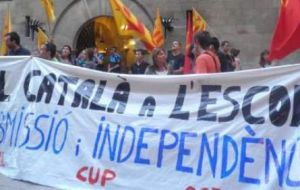MercoPress. South Atlantic News Agency
Scottish independence debate rattles across Europe fearing breakaway movements
 Spain fears Basques and Catalonians will want to follow the same path
Spain fears Basques and Catalonians will want to follow the same path British diplomats are working behind the scenes to dampen down concern in Europe that Scotland's independence debate could trigger breakaway movements across the continent, reports the Herald Scotland.
At least seven Spanish news outlets were in Edinburgh on Wednesday to cover Scottish National Party leader Alex Salmond’s address on the announced independence referendum question. After addressing parliament Salmon was taken to brief international journalists at Edinburgh castle, backdrop to centuries of conflict between the English and Scots.
Confidential communications reveal the British ambassador in Madrid has been confronted with mounting fears in Spain that the 2014 referendum in Scotland will spark demands for similar polls in Catalonia and the Basque Country.
The documents show UK ministers have been briefed to reassure their Spanish counterparts that Scotland's constitutional question is quite different from those of Spain's minority nations and regions.
Britain's ambassador in Madrid, Giles Paxman, in a telegram marked “restricted”, has set out the UK's official response to such speculation.
He said: “We need to step up our efforts to explain why that debate is being played out in different circumstances and why the search for a legal, fair and decisive resolution to Scottish pressure for greater autonomy need not be a threat to Spanish territorial integrity.”
Mr Paxman, whose elder brother Jeremy presents Newsnight, stressed the Spanish Government would be unlikely to allow a “regional” plebiscite along the lines of that planned by First Minister Alex Salmond.
Crucially, however, Mr Paxman signaled that Madrid jitters should not be allowed to interfere with Scotland's referendum. He wrote: “Spanish concerns should not, of course, influence the course of the constitutional debate in the UK.”
A London newspaper on Sunday cited an unnamed UK Government minister saying Spain would seek to block the European Union membership of an independent Scotland.
That claim was denied by the Spanish Government but not before it sparked a flurry of newspaper reports in Madrid, Barcelona and elsewhere. The media reaction forced Spanish Foreign Minister Jose Manuel Garcia-Margallo to say his country would remain neutral in Scotland's constitutional wrangles.
The UK Government is now apparently sending different signals to audiences at home and abroad. British diplomats overseas are playing down the impact of the referendum on Europe. But UK ministers, addressing a domestic audience, are continuing to play up the antipathy of big European players to Scottish independence.
British coalition sources stressed the Scottish independence referendum was having “serious political implications” for other European governments.
The source was referring to Spain and Italy – where the regionalist Northern League has shown huge interest in Scotland – and to Romania's Hungarian minority.
Nationalist sources stressed their well-developed international links. Many independence movements – from Corsica to the Caucasus – openly refer to Scotland as their pathfinder.
However, newly independent nations outside the European Union have not always received a warm welcome from the rest of the continent.
Spain, Russia, Greece and Cyprus, for example, have all yet to recognize Kosovo, the breakaway Serbian province. Russia has its own national questions to settle – on either side of its border. Greece and Cyprus fear any precedent for international recognition of the Turkish-speaking Northern Cyprus.




Top Comments
Disclaimer & comment rules-

-

-

Read all commentsLong Live Joseph Heredia
Jan 27th, 2012 - 02:53 pm 0Long Live Catalan Republica
It is known all nation-states in Europe feature separatists regions and factious political wings, displaying the gamut of positions up to complete independence, and that for decades the central governments have tried to prevent or balk the dehiscing of this weakest link in European sovereignty, despite continuous propaganda and even agitprop depicting European countries as beacons of democracy and self-determination.
Jan 27th, 2012 - 03:12 pm 0Some countries like Germany and France have foiled most internecine quarrels by ruthlessly oppressing local cultures and languages for over a century, supplanting these with the official government vernacular (Low German, Occitan), an indelible stain to their democratic reputations. Others like the UK and Spain have pursued manifold policies over the centuries, the most recent to slowly vouchsafe greater autonomy to places like Wales, Scotland, Galicia, Catalonia, etc. De facto however, these regions remain trammeled from genuine self-determination, their purview of interaction with the rest of the world amounting to the equivalent of a modern day, non-feudal suzerainty.
It will also be interesting to watch how such developments in Europe influence similar scenarios in the New World: Canada and Quebec, the United States and Texas/California, Brazil and Rio Grande do Sul/Santa Catarina, Mexico and Chiapas/Nuevo Leon, Chile and the Mapuche demesne/Mallaganes Region, Bolivia and Santa Cruz, among others.
One remarkable aspect of Argentina is that as the 7th largest nation in the world, it features no separatist movements. A citizen of La Quiaca, Iguazu Falls, Ushuaia, Mendoza, Mar del Plata, and El Calafate, as distant localities to one another as they are geographically (and from Buenos Aires), remain steadfast citizens and willingly so.
Thus it is difficult for me for example, to comprehend the forces that impel denizens within a country to conclude they must secede, and therefore muster the fervor to foment the implementation of lasting change.
Long Live Miguel Alsetegui
Jan 27th, 2012 - 03:48 pm 0Long Live Basque Republica
Commenting for this story is now closed.
If you have a Facebook account, become a fan and comment on our Facebook Page!